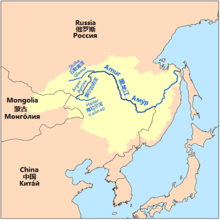Amur
English

Amur watershed
Etymology
From Russian Аму́р (Amúr) of unknown origin, but most likely meaning "black river" or "black dragon," judging from Manchu sahaliyan ula "black river," Mongolian Хара-Мурэн (Hara-Muren, “black river”), [1] and Chinese 黑龍江 (heilong jiang) "black dragon river," hence the likely calques. The second syllable mur may be cognate with Mongolian muren "river," Korean 물 (mur or mul) "water, river," obsolete Korean 미르 (mireu) "dragon," etc.
Proper noun
Amur
- The world's ninth longest river, forming the border between the Russian Far East and Northeastern China, emptying into the Pacific Ocean through the Strait of Tartary, where the mouth of the river faces the northern end of the island of Sakhalin.
- Amur Region or Amurskaya Oblast - a federal subject of Russia, its administrative centre is Blagoveshchensk.
Alternative forms
- Amur River
- Heilongjiang (Chinese name)
Derived terms
- Amur tiger
Translations
the river between the Far East Russia and China
|
|
Amurskaya Oblast
|
Heilongjiang — see Heilongjiang
See also
- Amur Darya or Amu Darya
- Heilongjiang
References
- Whatever sense the notion of black river may make around the world, it makes sense of "northern river" as likely as the black is ascribed to the north in Oriental tradition.
Czech
Pronunciation
Audio (file)
Proper noun
Amur m
- Amur (long river forming the border between the Russian Far East and Northeastern China, emptying into the Pacific Ocean through the Strait of Tartary)
Declension
Declension
| singular | plural | |
|---|---|---|
| nominative | Amur | Amury |
| genitive | Amuru | Amurů |
| dative | Amuru | Amurům |
| accusative | Amur | Amury |
| vocative | Amure | Amury |
| locative | Amuru | Amurech |
| instrumental | Amurem | Amury |
Derived terms
- amurský
Polish
Declension
This article is issued from
Wiktionary.
The text is licensed under Creative
Commons - Attribution - Sharealike.
Additional terms may apply for the media files.